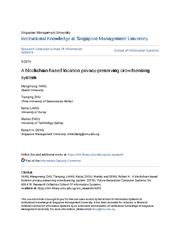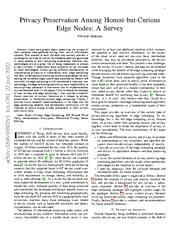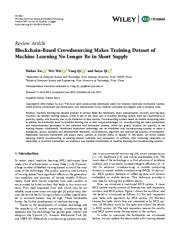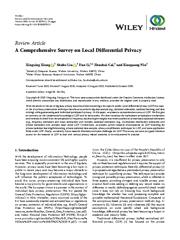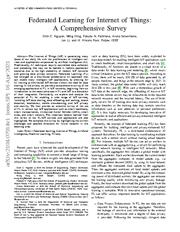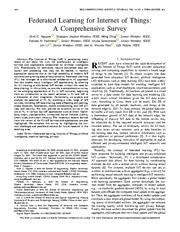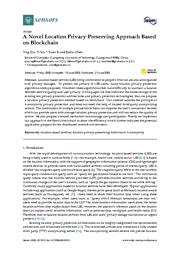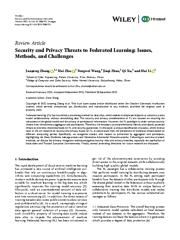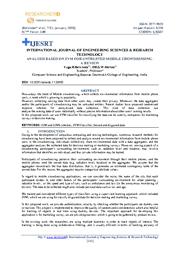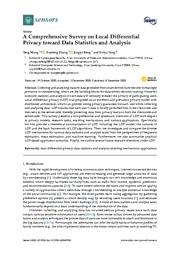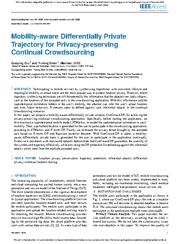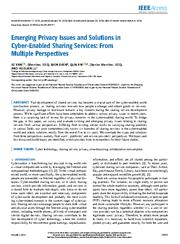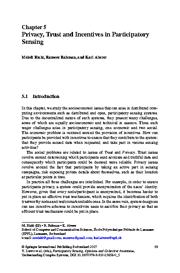A copy of this work was available on the public web and has been preserved in the Wayback Machine. The capture dates from 2020; you can also visit the original URL.
The file type is application/pdf.
Filters
A blockchain-based location privacy-preserving crowdsensing system
2019
Future generations computer systems
Crowdsensing enables workers with mobile devices to travel to specified locations and collect data, then send it back to the requester for rewards. ...
. • Prevent re-identifications attack by leveraging a private blockchain network. a b s t r a c t With the support of portable electronic devices and crowdsensing, a new class of mobile applications based ...
Introduction As a new emerging application of the IoT, crowdsensing takes advantage of sensor-equipped mobile devices to collect and share data [1] . ...
doi:10.1016/j.future.2018.11.046
fatcat:cfqpv6enxzap5jlxkhcxkyur5a
Privacy Preservation Among Honest-but-Curious Edge Nodes: A Survey
[article]
2022
arXiv
pre-print
Edge computing has been introduced as a promising networking paradigm for processing the incredible magnitude of data produced by modern IoT networks. ...
This extends to both the data they actively provide in exchange for services as well as the metadata passively generated in many aspects of their computing experiences. ...
Crowdsensing and Crowdsourcing Crowdsensing and crowdsourcing (also referred to as mobile crowdsensing and mobile crowdsourcing), are two similar, but different, data acquisition paradigms through which ...
arXiv:2208.05922v1
fatcat:ojiidimsf5hgxhafkdtnunpu3i
Density-Based Location Preservation for Mobile Crowdsensing With Differential Privacy
2018
IEEE Access
Called mobile crowdsensing, these techniques use workers with mobile devices to collect data and send it to task requester for rewards. ...
The partitioning method is based on worker density and considers non-uniform worker distribution. ...
PRELIMINARIES In this section, we present a typical privacy framework for mobile crowdsensing, followed by the basic concepts of differential privacy. A. ...
doi:10.1109/access.2018.2816918
fatcat:6fosrqaem5fdraizjfmospel4i
Blockchain-Based Crowdsourcing Makes Training Dataset of Machine Learning No Longer Be in Short Supply
2022
Wireless Communications and Mobile Computing
Crowdsourcing systems based on mobile computing seem to address the bottlenecks faced by machine learning due to their unique advantages; i.e., crowdsourcing can make professional and nonprofessional participate ...
In this paper, we review studies applying mobile crowdsourcing to training dataset collection and annotation. ...
[121] presented an incentive scheme based on dynamic demand in a mobile crowdsensing systems which is location-dependent. ...
doi:10.1155/2022/7033626
fatcat:6xc6wsi7ynaxnfhk2popfhxsma
A Comprehensive Survey on Local Differential Privacy
2020
Security and Communication Networks
Furthermore, we present current research circumstances on LDP including the private statistical learning/inferencing, private statistical data analysis, privacy amplification techniques for LDP, and some ...
Local differential privacy (LDP) is a state-of-the-art privacy preservation technique that allows to perform big data analysis (e.g., statistical estimation, statistical learning, and data mining) while ...
[43] proposed two novel locally private distribution estimation schemes for anonymized data collecting, namely, Single to Randomized Multiple Dummies (S2M) and S2M with Bayes (S2Mb). e basic block of ...
doi:10.1155/2020/8829523
fatcat:xjk3vgyambb5xioc2q5hyr2hua
Federated Learning for Internet of Things: A Comprehensive Survey
[article]
2021
arXiv
pre-print
Particularly, we explore and analyze the potential of FL for enabling a wide range of IoT services, including IoT data sharing, data offloading and caching, attack detection, localization, mobile crowdsensing ...
for data sharing. ...
FL for IoT Mobile Crowdsensing With the development of IoT, mobile crowdsensing is designed to take advantage of pervasive mobile devices for sensing and collecting data from physical environments to serve ...
arXiv:2104.07914v1
fatcat:b5wsrfcbynel7jqdxpfw4ftwh4
Federated Learning for Internet of Things: A Comprehensive Survey
2021
IEEE Communications Surveys and Tutorials
Particularly, we explore and analyze the potential of FL for enabling a wide range of IoT services, including IoT data sharing, data offloading and caching, attack detection, localization, mobile crowdsensing ...
for data sharing. ...
FL for IoT Mobile Crowdsensing With the development of IoT, mobile crowdsensing is designed to take advantage of pervasive mobile devices for sensing and collecting data from physical environments to serve ...
doi:10.1109/comst.2021.3075439
fatcat:ycq2zydqrzhibfqyo4vzloeoqy
A Novel Location Privacy-Preserving Approach Based on Blockchain
2020
Sensors
The combination of multiple private blockchains can disperse the user's transaction records, which can provide users with stronger location privacy protection and will not reduce the quality of service ...
In this paper, we first overview the shortcomings of the existing two privacy protection architectures and privacy protection technologies, then we propose a location privacy protection method based on ...
[43] proposed a privacy-preservation crowdsensing system based on blockchain for the defects of the centralized structure in the crowd perception system and the leakage of user location privacy. ...
doi:10.3390/s20123519
pmid:32575917
fatcat:mkltxsjcnnb2lbwi7hot5zciwq
Security and Privacy Threats to Federated Learning: Issues, Methods, and Challenges
2022
Security and Communication Networks
Federated learning (FL) has nourished a promising method for data silos, which enables multiple participants to construct a joint model collaboratively without centralizing data. ...
In this paper, a unique classification of attacks, which reviews state-of-the-art research on security and privacy issues for FL, is constructed from the perspective of malicious threats based on different ...
Moreover, in CDFL, the aggregator obtains the final global model through FL to provide prediction services for users, while participants only collect data (e.g., mobile crowdsensing). erefore, there is ...
doi:10.1155/2022/2886795
fatcat:mm5dhjmwkjei5cbgmw4jqog7q4
A Comprehensive Survey on Local Differential Privacy Toward Data Statistics and Analysis in Crowdsensing
[article]
2020
arXiv
pre-print
Collecting and analyzing massive data generated from smart devices have become increasingly pervasive in crowdsensing, which are the building blocks for data-driven decision-making. ...
Local differential privacy (LDP) has been proposed as an excellent and prevalent privacy model with distributed architecture, which can provide strong privacy guarantees for each user while collecting ...
[150] proposed a lightweight edge computing framework based on deep inference while achieving LDP for mobile data analysis. Moreover, Song et al. ...
arXiv:2010.05253v2
fatcat:uuts5enifreixjt4lf6yjrepl4
IJESRT INTERNATIONAL JOURNAL OF ENGINEERING SCIENCES & RESEARCH TECHNOLOGY ANALYSIS BASED ON SVM FOR UNTRUSTED MOBILE CROWDSENSING-A REVIEW
International Journal of Engineering Sciences & Research Technology
unpublished
However, collecting sensing data from other users may violate their privacy. Moreover, the data aggregator and/or the participants of crowdsensing may be untrusted entities. ...
Recent studies have proposed randomized response schemes for anonymized data collection. ...
Moreover, the data aggregator and/or the participants of crowdsensing may be untrusted entities. Recent studies have proposed randomized response schemes for anonymized data collection. ...
fatcat:khbg7btxwra3jarhb4invkx6we
A Comprehensive Survey on Local Differential Privacy toward Data Statistics and Analysis
2020
Sensors
Collecting and analyzing massive data generated from smart devices have become increasingly pervasive in crowdsensing, which are the building blocks for data-driven decision-making. ...
Local differential privacy (LDP) was proposed as an excellent and prevalent privacy model with distributed architecture, which can provide strong privacy guarantees for each user while collecting and analyzing ...
[149] proposed a lightweight edge computing framework based on deep inference while achieving LDP for mobile data analysis. Moreover, Song et al. ...
doi:10.3390/s20247030
pmid:33302517
pmcid:PMC7763193
fatcat:25iufaivynabdftrzq4rzxsz2e
Mobility-aware Differentially Private Trajectory for Privacy-preserving Continual Crowdsourcing
2021
IEEE Access
Zuo et al. explored the causes of data leakage in cloud [35] . Jin et al. proposed a solution for private-data transactions in the mobile crowdsensing in [36] . ...
Literature [25] generated decoys to provide the dummy privacy protection for anonymizing the actual user based on the social and travel behavior patterns. ...
For more information, see https://creativecommons.org/licenses/by-nc-nd/4.0/ ...
doi:10.1109/access.2021.3058211
fatcat:5smsufrgpjbqxl2257fyfj7wj4
Emerging Privacy Issues and Solutions in Cyber-Enabled Sharing Services: From Multiple Perspectives
2019
IEEE Access
Hot topics and less discussed topics are identified, which provides hints to researchers for their future studies. ...
Differing from existing similar works on surveying sharing practices in various fields, our work comprehensively covers six branches of sharing services in the cyber-enabled world and selects solutions ...
effective protocol for data analysis. ...
doi:10.1109/access.2019.2894344
fatcat:qapuhjkhs5embm2l6q2cq52ply
Privacy, Trust and Incentives in Participatory Sensing
[chapter]
2016
Understanding Complex Systems
This stresses the need for recruiting as many participants as possible to contribute enough and useful data and for guaranteeing their privacy protection and finally an efficient data analysis based on ...
The aggregator and the mobile nodes are assumed to be untrusted. Nodes can act maliciously by trying to infer measurements from their neighbors or by manipulating the aggregated data. ...
doi:10.1007/978-3-319-25658-0_5
fatcat:66gkb65axjhb5pomhidckicoom
« Previous
Showing results 1 — 15 out of 20 results

